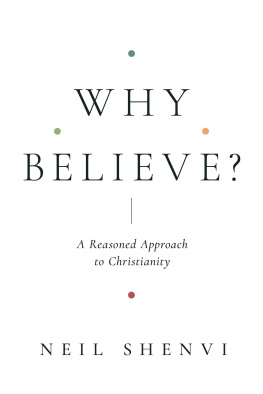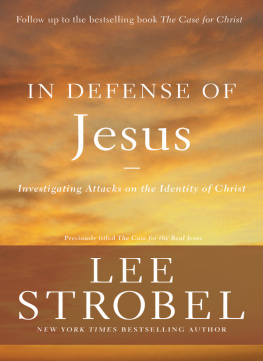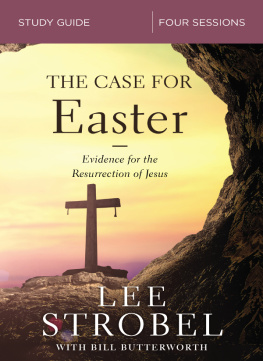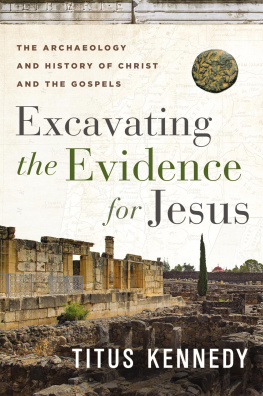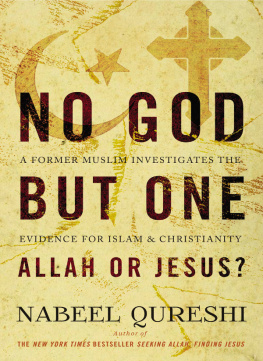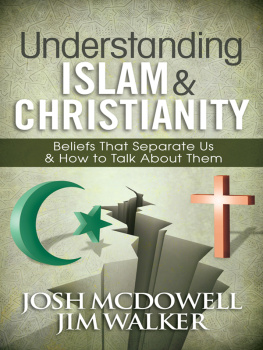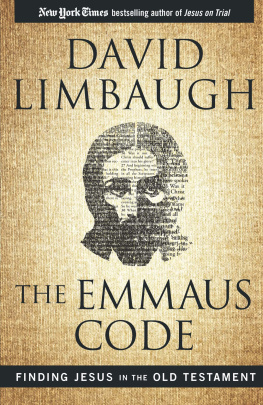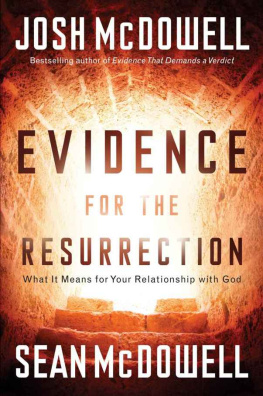Table of Contents
Landmarks
abiogenesis,
abuse,
Acts
confirmation by archaeology,
correct use of government titles in,
Adam, sin of,
addiction,
adultery,
aesthetic choice,
agnosticism
about existence of God,
about possibility of miracles,
Alberts, David,
altruism,
Amazing Grace (hymn),
amorality pill,
ancient sources, on the life of Jesus,
apathy,
apocalypticism,
apostles, belief in the resurrection,
appeal to ignorance,
Aramaic,
archaeology, corroboration of Gospel details,
argument from contingency,
argument from the gospel,
Aristotle,
Armenian genocide,
Aslan, Reza,
Athanasius,
atheism
falters in search for truth,
as normal,
and objective moral values,
and problem of evil,
atheistic evolution,
atheists
moral behavior of,
quest for truth,
recognize beauty of Jesuss life and teaching,
autonomy,
Balakian, Grigoris,
Barnabas,
Barnes, Luke,
Barrett, Justin L.,
Bauckham, Richard,
behavior modification,
Belgic Confession,
belief in the gospel,
bhakti yoga (Hinduism),
Bharati, Dayanand,
Bhaskarananda, Swami,
Bible
consistent with general revelation,
as Gods revelation,
inerrancy of,
inspiration of,
on the problem of evil,
skepticism about,
strict regulation of,
study of,
textual notes in,
Big Bang,
blind trust,
Bohr, Niels,
Book of Common Prayer,
Brown, Donald E.,
Brown, Michael,
Buddha,
Buddhism,
bullying,
Bultmann, Rudolph,
Butterfield, Rosaria,
Carr, Bernard,
Catechism of the Catholic Church,
causation,
Cavin, Robert Greg,
certainty,
charitable giving,
Chicago Statement on Biblical Inerrancy,
child development,
children
aggressive behavior of,
self-centeredness of,
child sexual abuse,
Chomsky, Noam,
Christianity
not inherently irrational,
optimistic view of Gods grace,
as outdated and irrelevant,
pessimistic view of humanity,
sexual ethic of,
truth claims of,
unique view of sin and salvation,
Christians, as judgmental,
Christian view of salvation, objections to,
Christian worldview, and scientific discovery,
church,
circumcision controversy in early church,
Collins, Francis S.,
comfort,
common ancestry,
compassion,
complacency,
confession of sin,
confidence,
conquistadores,
consciousness,
consumerism,
cosmological constant,
Coyne, Jerry A.,
Craig, William Lane,
creationists,
creativity,
Crick, Francis,
criminality,
cross,
and evil,
Crossan, John Dominic,
crucifixion,
Crusades,
cultural relativism,
Cyphers Challenge,
Darwin, Charles,
Davies, Paul,
Dawkins, Richard,
deism,
Dennett, Daniel,
dharma ,
disciples of Christ, and appearances of the resurrected Jesus,
divine command theory,
divine hiddenness,
divorce,
Donne, John,
Drummond, Henry,
dying grandmother scenario,
Dyson, Freeman,
Edwards, Jonathan,
Ehrman, Bart D.,
Eichenwald, Kurt,
Eightfold Path (Buddhism),
Einstein, Albert,
empathy,
empty tomb,
Epstein, Greg M.,
eschatology, in message of Jesus,
Esposito, John,
eternal suffering in hell,
eternity, and evil,
ethical subjectivity,
ethnic cleansing,
Euthyphro dilemma,
evidence,
and commitment,
for Gods existence,
and worship,
evil
and eternity,
existence as real and temporary,
and the incarnation,
and mercy,
as problem for all worldviews,
as problem for atheism,
results in future goods,
evolution
as descent with modification,
and moral values and duties,
as objection to theism,
and tendency to believe in God,
evolutionary theory,
evolution of morality,
existence of God
objections to,
urgency of question,
extrabiblical gospels,
faith
exercised daily,
nature of,
feelings,
Feynman, Richard,
1 Clement,
Fishbane, Michael,
fitra ,
Flew, Antony,
forgiveness,
Four Noble Truths (Buddhism),
Fredriksen, Paula,
freethinkers,
free-will theodicy,
Fry, Stephen,
fundamental constants,
Funk, Robert W.,
Gandhi,
Ganssle, Greg,
Garriga, Jaume,
general revelation,
generosity,
genetic drift,
genocide,
geographical corroboration of the Gospels,
God
arguments against,
aseity of,
character of,
as eternal,
existence of,
goodness of,
guidance of natural processes,
hiddenness of,
holiness of,
judgment on sin,
justice of,
as love,
mercy of,
moral argument for existence of,
and natural order,
omnipotence of,
as a person,
reveals himself,
self-existence of,
sovereignty of,
speaks through the Bible,
as uncaused First Cause,
god of the gaps,
Golden Rule,
good, instrumental versus intrinsic,
gospel,
as best argument for the truth of Christianity,
creates love toward God,
Gospel of Mary,
Gospel of Peter,
Gospel of Thomas,
Gospel of Truth,
Gospels
Aramaisms in,
corroboration from archaeology,
corroboration from onomastics,
geographical detail of,
historical reliability of,
historicity confirmed by non-Christian sources,
Jewish religious details in,
reliability of,
as theology not history,
undesigned coincidences in,
grace,
gradualism,
Greear, J. D.,
Greene, Brian,
guided evolution,
Hammer, Reuven,
Haneef, Suzanne,
happiness,
and morality,
and religious belief,
in this life,
Harris, Sam,
Hauser, Marc,
healing,
Heidelberg Catechism,
hell,
Here Is Love (hymn),
hermeneutics,
Hinduism,
historical Adam,
historiography,
Hitchens, Christopher,
hive-bee intuitions,
Holocaust,
Holodomor,
Homer, Iliad ,
Horton, Michael,
Hoyle, Fred,
human beings
behavior and inclinations of,
mathematical ability of,
sinfulness of,
human flourishing
and morality,
and religious claims,
and self-interest,
and truth,
human nature,
human rights,
humility,
hyperactive agent detection, and origin of religion,
I Am Legend (film),
Ilan, Tal,
image of God,
incarnation, and evil,
individuality,
infanticide,
intellectual humiliation,
intelligent design,
introspection,
Islam,
Jastrow, Robert,
Jesus Christ
burial of,
at center of Christianity,
claims of,
crucifixion of,
death of,
deity of,
dying to save his people from their sins,
entered into our pain,
as evil megalomaniac,
as good moral teacher,
kept the law of God,
life of,
as real Savior,
regarded the Bible as inspired,
resurrection of,
as best explanation of empty tomb,
evidence for,
implausibility of naturalistic accounts of,
naturalistic explanations of,
significance of,
skepticism not rooted in evidence,
objections to,
sacrificial death of,
as servant,

